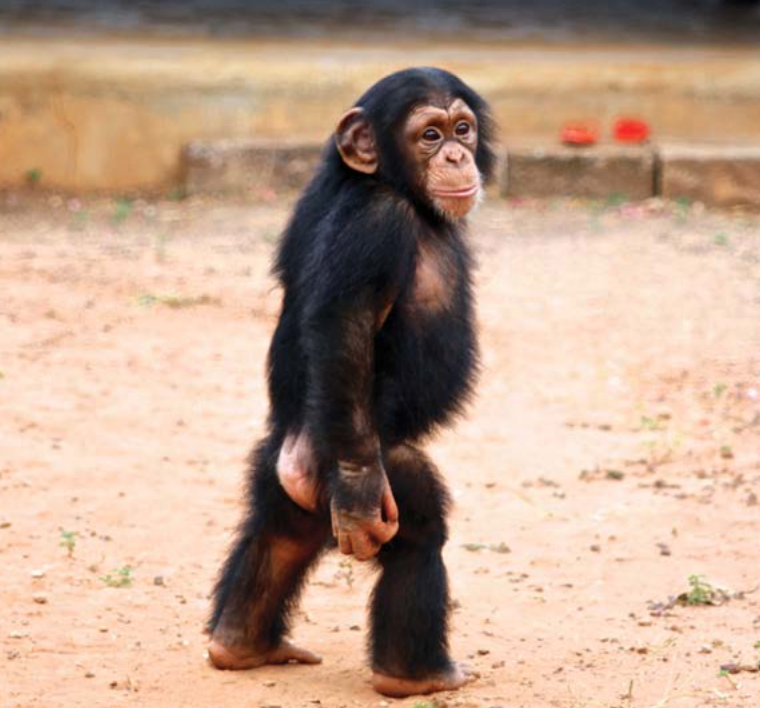Get updates and action alerts from Friends of Animals by joining our email list.
X
Chimpanzee Rehabilitation Project
For booking and travel inquiries, email baboonislands@gmail.com
In a November 2008 landmark agreement with the Gambian government, Friends of Animals agreed to help fund the Chimpanzee Rehabilitation Project, an island sanctuary established in 1979 in West Africa in the River Gambia National Park. It is home to 149 chimpanzees who live in four groups in relative freedom—without bars or cages—on three of the park’s five islands.
Many of the refuge’s chimpanzees were confiscated as orphans of parents killed by hunters for bushmeat or parents who were taken for exploitive industries. Some were voluntarily relinquished by people who had unwisely tried to make them into pets.
But the chimpanzees now enjoy the national park’s gallery forest, woodlands and swamp savannahs free from exploitation. Friends of Animals’ support ensures that the chimpanzees receive supplemental food for a complete diet and helps prevent over stripping of the island vegetation by the chimpanzees. FoA’s support also makes possible the health monitoring that is vital to the survival of these great apes.

The CRP has also become a destination offering ecotourists expeditions that guide visitors through the river where they will see some of the chimps, as well as hippos, crocodiles, baboons, red colobus monkeys and more than 240 species of birds.
Director Janis Carter, a primatologist who helped establish the sanctuary, maintains the 1,500-acre, open-air sanctuary, while also working to protect the region’s habitat, provide local environmental education and foster community development.
Carter recognized early on that the support of local villagers was essential to ensure the chimps’ safety. In the mid 1980’s one of the original chimps died, possibly at the hands of a poacher, and Carter realized how little she knew about the people who occupy the villages along the Gambia River. So, she started reaching out to them and to communities in neighboring Senegal and Guinea to educate community leaders about chimpanzee feeding and migration areas to help them direct farming and logging in places that wouldn’t interfere with chimp survival.
She told Smithsonian Magazine in 2005: “The best hope is to forge a relationship between people and chimps living close to them.”
FoA couldn’t agree more that without the involvement of local people in conservation in Africa, it is impossible to reduce poaching, human-animal conflict or agricultural encroachment on wildlife habitat.
That’s why we are proud that the CRP channels 10% of tourism profit into local communities. Tourism revenue from 2019, for example, is being used to purchase a boat so sick villagers can have easier access to a health clinic. CRP also raises money for the Clean Water and Gardens Project, which started in 2012 in four villages. The project consists of constructing a borehole for clean water extraction, establishing a community garden and training community members about horticulture, pump maintenance and business practices.
Between 2012-2014, a total of 13 boreholes and accompanying gardens were provided to villages neighboring the CRP and River Gambia National Park. An estimated 10,000 rural Gambians benefit from the program.
“These are all measures of improvement of life, “Carter explains, “but also less stress on the environment—giving habitat and wildlife a break.”
You can read articles about the Chimpanzee Rehabilitation Project here:
2024
Morris: A wild warthog on the savannah
2023
Karen: Janis Carter shares an unbreakable connection with a chimp in River Gambia National Park
2021
Carter’s Selflessness, Commitment to Primates Showcased in “Lucy the Human Chimp” Documentary
2020
Community-based tourism is the silver bullet for protecting African wildlife
2017
Toto the chimpanzee’s story has a happy ending
2015
Chimpanzee Rehabilitation Project extends help to red colobus monkeys
